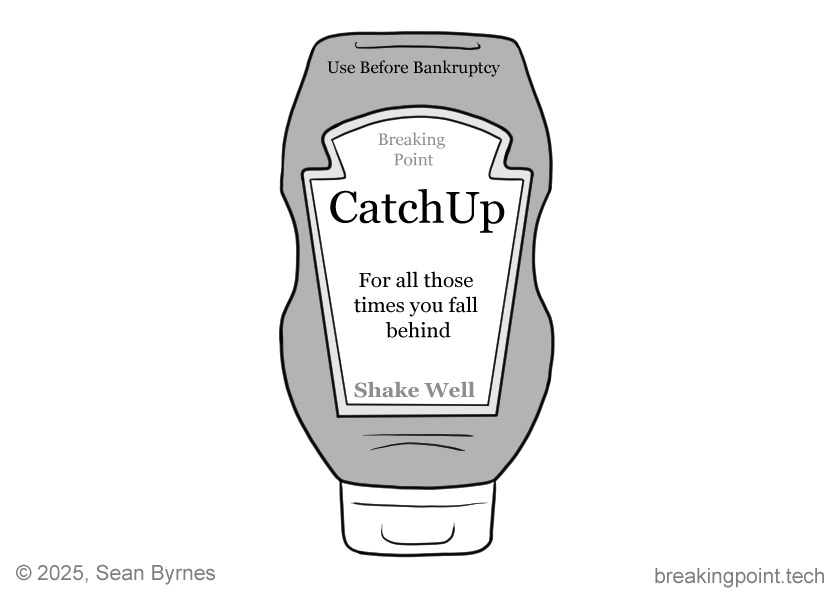Playing Catch Up
When you fall behind, don’t panic. It will make things worse.
If you liked reading this, please click the ❤️ button on this post so more people can discover it on Substack. Thanks!
Every company falls behind at some point. Maybe your competitor releases a new product that will take you 6 months to match. Or maybe you failed to hire enough salespeople to hit your revenue targets and it will take 6 months to hire them. Or maybe you missed a big market shift and need to scramble to react.
Falling behind can be the result of doing poorly (falling behind competitors) or success (falling behind in hiring) so no company is immune to it. In fact, the question is not whether you will fall behind but when and how.
The problem with falling behind is that it triggers panic. When you realize you are behind, you want to quickly catch up. Quick, release new features to match the competition! Quick, hire as many salespeople as we can! These panicked reactions often do more harm than good, since you are reacting instead of thinking.
If you realize you are behind, the first thing you need to do is take a deep breath. Don’t panic, and certainly don’t reach for a quick & easy solution. Accept that you’re behind and that there is a lot of work ahead of you to catch up.
Then, ask yourself these questions to formulate a plan:
Why did we fall behind? Was it something you did, or something that happened to you? The solutions differ greatly based on the answer and we need to understand the root cause before we do anything about it.
Is it worth catching up? Sometimes, it’s not worth catching up. If your competition really is 6 months ahead, by the time you get there they might be another 6 months ahead. Instead, you might change the game and target an entirely different set of goals or strategies.
What is the best first step? Catching up will take a long time, and you can’t throw together a comprehensive long term strategy quickly. What you can do is identify the right first step to either stem the bleeding or give you the most options for how to proceed.
How do we measure progress? If you’re behind, there must have been some indication telling you that. For example, if you’re behind hiring sales people it’s likely that you realized your quota coverage or pipeline growth is well below your requirements. However, that might not be the right way to measure your progress in catching up! If we start hiring salespeople today, they won’t influence those metrics for a long time so we need a different set of measurements.
Hopefully, in taking the time to answer these questions the initial panic has worn off. You should have interrogated your situation thoroughly (and as objectively as possible) which puts you in a great position to start making a plan.
We all want to win our markets, but that path is rarely a straight line. Instead, we all fall behind along the way and need to find a way to catch up. When that happens, your reaction and response will determine if you fall farther behind or catch up.
It turns out, if you are great at catching up you are likely going to do much more than catch up - you’re going to win. The operational excellence, and discipline, that comes from catching up quickly creates momentum that can carry you forward as a sustainable competitive advantage.
So, if you’re falling behind don’t panic. It’s a chance for you to come from behind and win, all you need to do is take it!
For more on Leadership, see:


